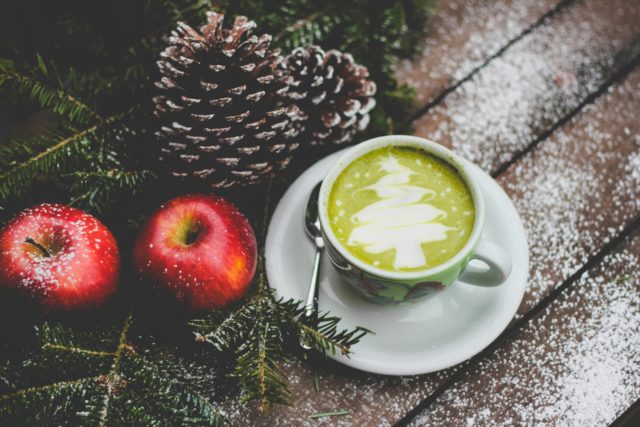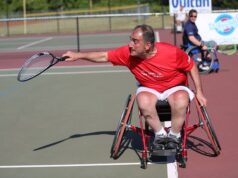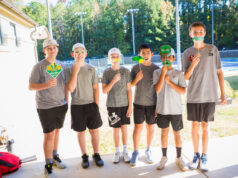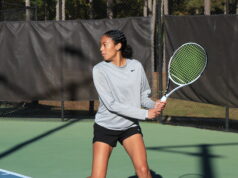How to stay fueled, hydrated, and healthy.
By Page Love, MS, RDN, CSSD, LD, PTR and Hailey Wilson, Dietetic Student
Fuel your winter workouts the smart way. As temperatures drop, your body faces new challenges — from staying warm and energized to fighting off colds and maintaining motivation. Whether you’re training for winter tennis, running, or enjoying outdoor sports, the right nutrition can make a major difference in performance, recovery, and overall well-being.
Here’s how to fuel smarter this winter — with evidence-based strategies for energy, immunity, and performance.
Power Up with Nutrient-Dense Carbohydrates
Carbohydrates are your body’s main source of energy — and in the winter, they do even more. Complex carbs not only fuel your muscles but also help lift your mood and support hydration. They work to boost serotonin (to combat the “winter blues”), help store water in muscles to maintain hydration and provide long-lasting energy for training and recovery.
Smart carb choices for winter include whole grains like oatmeal, quinoa, brown rice, whole-grain bread or pasta; and seasonal produce such as sweet potatoes, beets, yams, and winter squash.
Consider adding produce with nitrates and antioxidants to your training diet. Adding these foods will dilate your blood vessels, causing the blood to reach working muscles more quickly. Antioxidants will protect blood vessels and keep the nitric oxide active longer. Here are some foods that have positive effects on exercise in the cold: beets; spinach, arugula, kale; green or black teas (the warmth of tea also provides comfort); pomegranate boosts nitric acid production; berries; and citrus have Vitamin C that helps with nitric oxide stability.
These nutrient-dense carbs help you stay fueled, focused, and motivated on and off the court.
Fuel Muscle Recovery with Protein
Don’t forget protein — your body’s key repair tool. Cooler temperatures can increase energy demands, and protein helps rebuild muscles and maintain strength. Good sources include lean meats, fish, eggs, beans, lentils, tofu, nuts, and dairy.
Pro Tip: A post-match snack that combines carbs and protein — like chocolate milk, Greek yogurt with fruit, or a smoothie — speeds up muscle recovery and restores glycogen for your next session.
Support Immunity with Vitamins C, D, and Zinc
Cold weather and indoor training can make you more vulnerable to colds and infections. Strengthen your immune system with these three nutrients:
- Vitamin C: Found in citrus fruits, tomatoes, and peppers; supports immune defense.
- Vitamin D: Produced from sunlight, which is limited in winter — include fortified milk, eggs, or supplements (if recommended).
- Zinc: Found in fish, eggs, dairy, and fortified cereals; supports immune function and tissue repair.
- Omega-3 fatty acids: Good fats your body needs but does not produce on its own that help decrease inflammation. Choose more fish, nuts, and seeds.
Don’t overlook frozen produce. Even frozen vegetables like broccoli, Brussels sprouts, carrots, and squash retain most nutrients and are great for winter immunity.
Boost Energy with Iron and B-Vitamins
If winter fatigue hits hard, iron or B-vitamin deficiency could be a factor. These nutrients help deliver oxygen to muscles and keep energy levels steady. Best sources include lean meats, beans, lentils, spinach, eggs, and fortified cereals. Pair iron-rich foods with vitamin C to boost absorption.
Stay Hydrated — and Replace Electrolytes
Cold air can be dehydrating, even when you’re not sweating much. Because your thirst reflex decreases in the cold, hydration often suffers. Here’s a good hydration game plan:
- Drink 16-24 oz. of water before training.
- During play, sip about 4 oz. every changeover.
- Aim for 5-1 liter per hour of fluids, even without thirst.
- Continue hydrating post-match with water or a sports drink.
- Target 2-3 liters daily for overall hydration.
Don’t forget electrolytes. Even in cold weather, you lose sodium and potassium through sweat and breath. Snack on bananas, oranges, soups, or lightly salted foods, or use an electrolyte beverage if training intensely. Pro Tip: Choose warm or room-temperature drinks to stay comfortable. Green tea hydrates, provides antioxidants, and supports immunity — perfect for cold-weather sessions.
Warm Up with Nourishing Comfort Foods
Winter is the perfect time for hearty, hydrating meals like soups, stews, and slow-cooked dishes. They help you stay warm while providing nutrients and fluids. Try adding lentils, beans, root vegetables, and whole grains for complete recovery meals. A vegetable stew with quinoa or barley makes a perfect post-practice refuel — comforting, hydrating, and rich in nutrients.
Eat for Mind and Mood
Winter can challenge not just your body, but your mindset. Nutrition plays a key role in keeping you focused and upbeat. Along with complex carbs, include omega-3 fatty acids to reduce inflammation and support brain health.
Additionally, cold weather often means rich foods and fewer outdoor activities. You don’t need to skip your favorite treats — just practice mindful moderation.
Smart strategies:
- Enjoy desserts in small, intentional portions — sit, slow down, and savor each bite.
- Swap indulgent sweets for Greek yogurt, fruit, or low-fat chocolate milk.
- Eat every 3-5 hours or in 5-6 smaller meals to stabilize energy and reduce cravings.
- Fill your plate with fiber-rich foods and colorful produce to stay full longer.
A regular eating schedule helps balance metabolism, prevents overeating, and keeps you fueled for performance.
Dress Smart: Nutrition Meets Thermoregulation
Nutrition and attire go hand in hand. Dress in breathable layers to conserve body heat and prevent energy loss. You can lose up to 40 percent of your body heat through your head — so keep that hat on during training or matches!
Winter training builds the foundation for spring performance. With the right nutrition, hydration, and recovery habits, you’ll stay healthy, strong, and mentally sharp all season long. Fuel smart, stay warm, and make this winter your strongest season yet!
Page Love is an avid ALTA participant and sport dietitian/nutrition advisor for the WTA and ATP professional tours, serves on the USTA sport science committee, consults with Resurgens Orthopaedics, and has a private practice in Sandy Springs. You can reach her at nutrifitga.com. Hailey Wilson is an undergraduate student at Life University working towards getting a nutrition degree and looks forward to working in dietetics in the near future!




